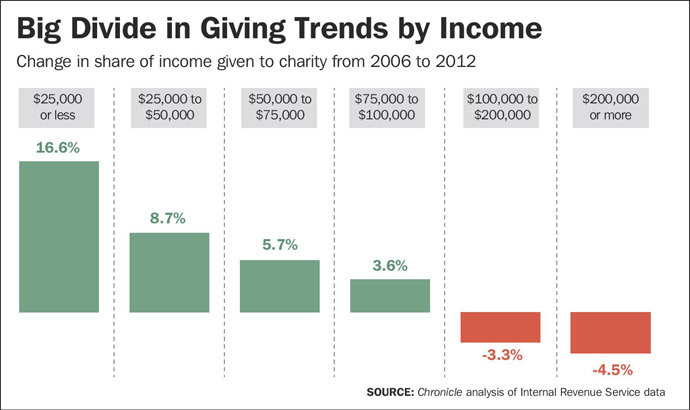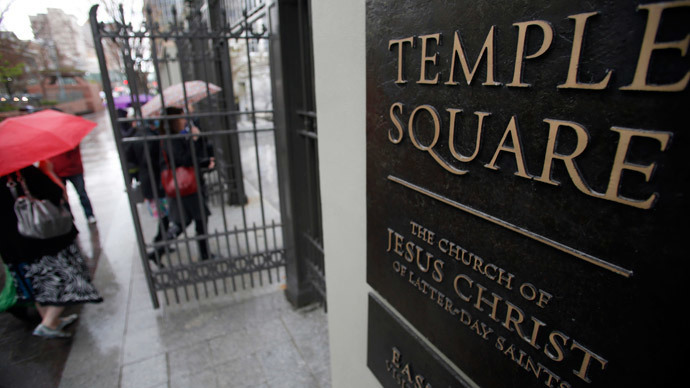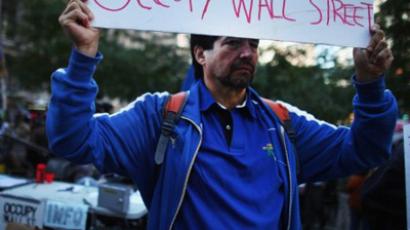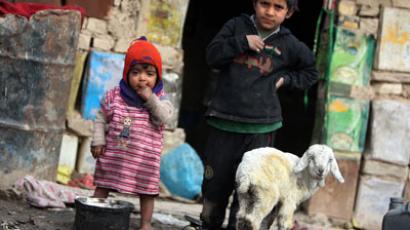Poorer conservatives more generous than wealthy liberals – new study

Less well-off families from red states donate a relatively higher – and growing – proportion of their money to charity, while those at the top have been giving a smaller share as their income has increased, a new extensive study has revealed.
Respected non-government sector newspaper The Philanthropy Chronicle collated the itemized charity deductions on the tax returns of hundreds of millions of Americans between 2006 and 2012, the latest year available. While only about a third of all givers write off their charity expenses, the sums included about 80 percent of all donations in the country.

The study noted that while the amount of charitable giving by the US as a nation has remained steady at 3 percent, the poorer people are, the greater amount they spend on charity. And this trend has been exacerbated in the years covered by the study, which showed that those earning $25,000 or less contributed 16.6 percent more of their income, while those with incomes of over $200,000 were spending 4.5 percent less of their money on charity in 2012 than in 2006. The study does not give the countrywide overall percentage of money donated by each group.
Several explanations have been posited for the findings.
“Lower and middle-income people know people who lost their jobs or are homeless, and they worry that they themselves are a day away from losing their jobs. They’re very sensitive to the needs of other people and recognize that these years have been hard,” explained Stacy Palmer, editor of the Chronicle of Philanthropy.
Meanwhile, the wealthier donors, who had been able to afford largesse during the fat years through the 90s and early 2000s, became “nervous and cautious” as the financial crisis struck in 2008, threatening their incomes, property and shares.
The study also says in places like Las Vegas – whose giving went up 15 percent in real terms – charities redirected their fundraising efforts from the big businessmen, to poorer individuals they had no time and resources for earlier.
Another explanation might be that charity giving can remain fairly inelastic in such a short period, despite fluctuating incomes. So, while the poorer people, hard hit by the crisis have struggled to maintain their giving commitments, America’s highest earners, who have recovered most quickly after the crash, have not yet readjusted their giving upwards.
After all, the figures show that overall donations from the wealthiest Americans have gone up by $4.6 billion, adjusted for inflation, to $77.5 billion between 2006 and 2012, showing that they are giving more in absolute terms, just not as a proportion of their growing pay packets.

Utahans and Romney voters give most
In an even starker finding, the study shows that the religious and conservative states are the most generous givers. Seventeen of the most generous states, in relative terms, voted for Romney in 2012, while 15 of the 17 least generous ones picked Obama for re-election.
This may expose a correlation between conservative voters believing that redistribution is something that should be done out of their own pocket, not by the government.
It may also highlight links between religious belief – more common among Republican voters – and charity donations, which are funnelled towards, and encouraged by the Church.

Not coincidentally, the most generous state is Utah (with a giving rate of 6.56 percent), which is dominated by Mormons, who have to give a tenth of their income to their church. On the other side of the scale is New Hampshire, where less than a third of the people say they believe in God, and which donates 1.74 percent of its incomes to charity.
Similarly, the cosmopolitan, urbane San Francisco and Boston are at the bottom of a similar ranking for cities, while the Southern and Central strongholds of Salt, Lake City, Birmingham, Memphis, Nashville and Atlanta are among some of the most generous.
The most generous town in the US was Canby in California, where 645 people gave $436,000, or 18 percent of their income, to philanthropic causes.














